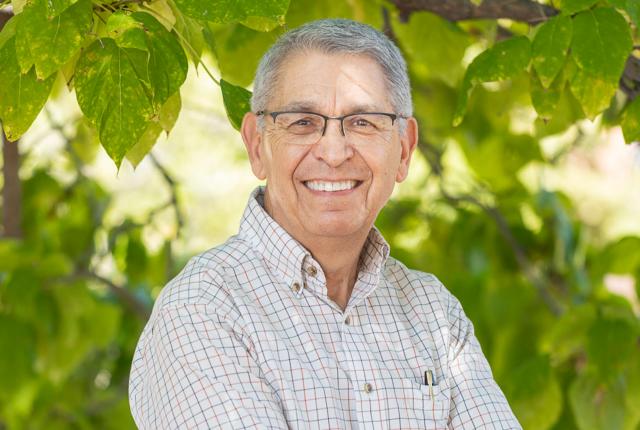Dr. Francisco Crespin has devoted his career to helping patients from underserved communities. Photograph by Gabriella Marks.
WHENEVER DR. FRANCISCO CRESPIN JR. arrived at Albuquerque’s Westside Emergency Housing Center for a 5 p.m. shift, a deep line of patients was always waiting. Among them were individuals who had lived on the streets for days or years, battling opioid addiction or mental illness, or ailing from a common cold or COVID-19.
“No matter how many patients lined up or how late it got, he was always willing to see the next person,” says Dr. Sara Doorley, medical director for Albuquerque’s Health Care for the Homeless and Crespin’s supervisor before his retirement. “He always understood that illness doesn’t have walls or boundaries. He was always willing to meet people where they are, even if that meant driving to the west side or ending his clinical day at 10 p.m.”
Crespin’s work with Health Care for the Homeless from 2019 to the summer of 2020 was the latest entry in a career of public health service in New Mexico. In the early seventies, the Las Vegas, New Mexico, native entered the Navy at age 18. In boot camp, he filled out a questionnaire asking where he’d like to serve. “Medic” was his last choice, yet he received that assignment—and it changed his life’s trajectory.
His work with Navy physicians and treating wounded soldiers returning from the Vietnam War inspired him to become a family physician.
“I took great satisfaction from taking care of the service members,” he says. “It was something I was good at.”
Repaying his medical school expenses as a member of the National Health Service Corps took him to Las Cruces and La Clinica de Familia, where he went from entry-level doctor to medical director and physician supervisor over his 20-year career. Many of his patients were immigrants or first-generation Americans who worked in the chile and onion fields of Doña Ana County. His Migrant Health Initiative, providing medical services to this population, continues today.
“Starting with the military and having the opportunity to work with underserved populations, I came to realize that I was blessed with having a skill to help others,” he says. Seeing the poverty the migrant workers encountered inspired him to earn his master’s in public health. “So much of what impacts an individual’s public health is socioeconomic health,” he says. He also had stints as a health officer with the New Mexico Department of Health and on the New Mexico Medical Board.
In 2012, he was called to military service again. Upon completing his officer leadership course and self-proclaimed “geriatric physical training,” he entered the Army Reserve.
“I was appreciative of the military for getting me started in medicine,” he says. “It just seemed like a worthwhile thing to do.
After exiting the military yet again, he wanted to use his skills to help homeless people. When COVID-19 hit at the tail end of his year with Health Care for the Homeless, he was faced with treating an especially vulnerable population with congregate living situations and a lack of resources—sometimes things as simple as running water to wash their hands frequently.
“Frank never blinked an eye,” Doorley says. “He just jumped into clinical care.” Thanks to a community-wide effort among homeless service providers, Crespin and Doorley experienced fewer cases of COVID-19 than they expected.
Crespin shrugs off the hero designation. “I’ve had the opportunity to take care of patients who were pretty inspiring to me,” he says, “because they were heroic in their own lives.”


